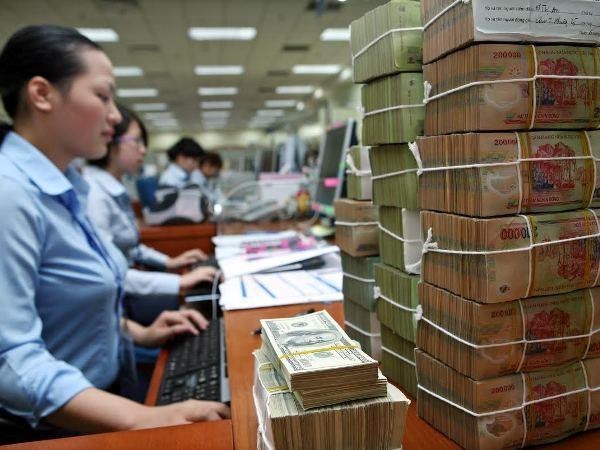Medium- and long-term capital pressure forces banks to hike rates
 A transaction at ABBank (Photo: VietnamPlus)
A transaction at ABBank (Photo: VietnamPlus)
Hanoi (VNA) – Local banks have raised their interest rates in a move to attract depositors and increase their medium- and long-term capital.
The interest rates of many banks have been adjusted up 0.7-0.8 percent per year in recent days. According to experts, in addition to banks’ need for money to meet lending demand, the rates often hike during the year-end.
Race becomes fiercer
The Saigon - Hanoi Commercial Joint Stock Bank (SHB) has just posted its highest interest rate at 8.2 percent per year, applied for all 13-month deposits. The rate has also been raised from 7 percent to 7.8 percent for six-month term, 8 percent for nine-month term, and 8.1 percent for 12-month term. Earlier, the highest annual interest rate was 7.2 percent.
The An Binh Commercial Joint Stock Bank (ABBank) has also hiked its interest rates by 0.7 percent and 0.8 percent for six-month and 12-month terms to 7.5 percent and 8.5 percent, respectively. With the new rates, ABBank is now considered one of the most competitive bank in the deposit market for individual customers.
At NamABank, the interest rates for terms of between 25 and 36 months increased 0.5 percent to 7.9 percent. Meanwhile, for the terms of 14-23 months, the rates climbed to 7.7-7.8 percent.
According to Pham Duy Hieu, ABBank General Director, this interest rate adjustment is an effort of his bank to create opportunities to increase finaical benefits for clients who want to seek a safe and effective investment channel. In addition, the bank also wishes to have more medium- and long-term capital to serve its business demand in the coming time as well as to implement the roadmap to reduce the proportion of short-term capital according to the State Bank of Vietnam’s direction.
Meanwhile, SHB General Director Nguyen Van Le said that the rate hike is to attract custmers’ long-term deposits to increase capital sources in anticipation of business opportunities in the year-end months.
Financial experts said depositing is still considered a safe traditional investment channel trusted by customers. Moreover, in the context of competitive interest rates among banks in the market, it continues to be one of the leading saving channels for families.
Not only raising deposit rates, some banks have stepped up issuing certificates of deposit (CDs).
VietCapitalBank has just officially announced the issuance of CDs for individual and institutional customers with interest rates of up to 10.2 percent per year.
According to a survey, the interest rates of CDs issued by banks are much higher than those of normal deposits. In particular, there are two banks issuing certificates of deposit with an annual interest rate of 9.1 percent, namely VIB and VietABank. Most other banks apply an interest rate of over 8 percent per year for CDs.
It can be seen that big capital mobilisation pressure is making deposit interest rates high and even higher in the coming time. As the capital demand of businesses and business households sharply increases during the year-end period, banks need to increase the mobilisation of capital to meet credit growth.
 (Illustrative photo: VietnamPlus)
(Illustrative photo: VietnamPlus)
Will lending interest rates decrease?
Since the beginning of August, four large banks - Vietcombank, Agribank, BIDV and VietinBank and two joint stock banks - VPBank and Techcombank, have been pioneering in cutting lending rates in priority areas by 0.5-1 percent to 5.5-7.5 percent per year for short-term loans. However, with deposit rates rising in recent days, experts believe the expectation that some large banks will reduce lending rates for other banks to follow is hardly to come.
The reason for this is that the banks' capital costs are still quite high so in order to maintain profitability, they must keep lending rates high.
Dr. Nguyen Tri Hieu, an expert in banking and finance, analysed that some banks are still raising deposit rates, first of all because of the State Bank of Vietnam's regulations on the ratio of short-term capital for medium and long-term loans, which will fall from 45 percent to 40 percent this year and may be only 30 percent in the coming years.
In particular, small banks have much short-term capital, so they must increase medium- and long-term capital by raising interest rates. When the banks raise interest rates, it will affect the interest rate level of the whole system.
"We are waiting to see how the lending interest rate cuts will affect the deposit rates market, but I have not seen any signs of lowering interest rates,” he said, adding that the capital costs of small- and medium-sized banks are still high, so these banks can hardly reduce the rates./.













